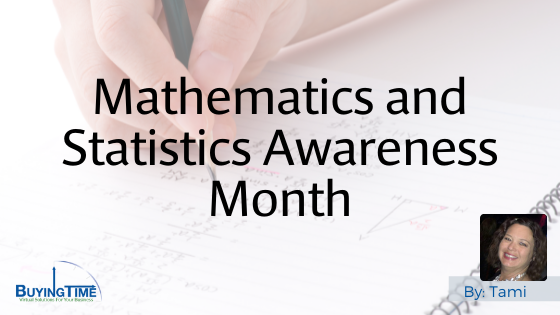Mathematics and Statistics Keep the World Spinning!
Mathematics and Statistics Awareness Month is held each year in April. Its goal is to increase public understanding of and appreciation for mathematics and statistics. Mathematics and Statistics Awareness Month began in 1986 as Mathematics Awareness Week with a proclamation by President Ronald Reagan. The original week included mostly activities at the national level but since then the emphasis has shifted to local and regional activities intended to highlight the importance of mathematics.
April marks a time to increase the understanding and appreciation of mathematics and statistics. Why? Both subjects play a significant role in addressing real-world problems—internet security, sustainability, disease, climate change, the data deluge, and much more. Research in these and other areas is ongoing, revealing new results and applications every day in fields such as medicine, manufacturing, energy, biotechnology, and business. Mathematics and statistics are important drivers of innovation in our technological world, in which new systems and methodologies continue to become more complex.
The theme for this year’s Mathematics Awareness Month is Mathematics and the Cosmos. As the main statement of the theme says, “mathematics is at the core of our attempts to understand the cosmos at every level. Many institutions across the nation will organize special events during April with the goal of highlighting the value, usefulness, and beauty of mathematics.”
Why is math so important in life?
Math helps us have better problem-solving skills. Analytical thinking refers to the ability to think critically about the world around us. Reasoning is our ability to think logically about a situation. Analytical and reasoning skills are important because they help us solve problems and look for solutions.
What do you learn from mathematics? Mathematics has evolved over many centuries to help solve problems. Math teaches us to think logically; identify and state the problem clearly; plan how to solve the problem, and then apply the appropriate methods to evaluate and solve the problem.
What is the importance of mathematics in our daily life? In general, studying the rules and ideas of mathematics can help us understand the world better. Some examples of math problems are addition, subtraction, multiplication, division, calculus, fractions, and decimals.
This April, let’s celebrate mathematics and statistics and the diverse researchers and students in these fields who are contributing so much to furthering discoveries, solving problems, and finding beauty in our world.

